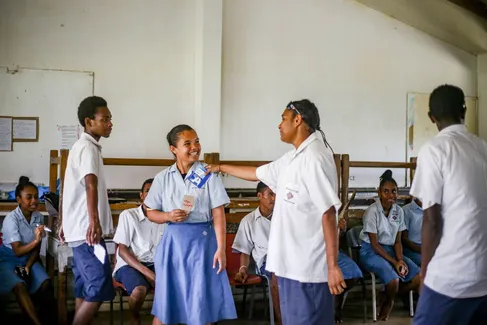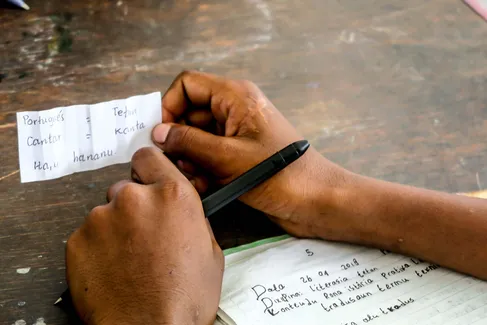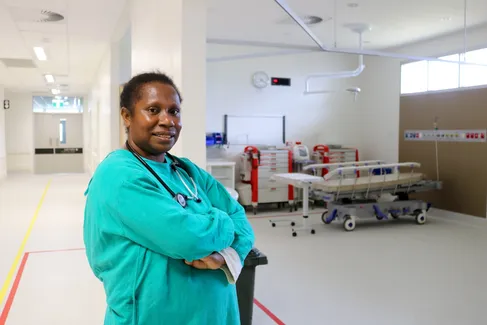Nurturing the next generation
Supporting nutrition, education and development of Timor-Leste’s youngest citizens through the provision of regular cash payments.
Timor-Leste
Purpose
A social protection program providing vital financial support during pregnancy, ensuring access to prenatal care and proper nutrition to improve the health of mothers and babies.
Approach
- To assist pregnant women to access essential resources for a healthy pregnancy and a well nourished child, and reduce the incidence of stunting
- Coordinate the distribution of social payments transparently and efficiently - for both the government of Timor-Leste and recipients.
- Digital transformation of the social payment system in close partnership with government, including capacity building and a sophisticated management platform enabling real-time monitoring of payments
Partners
Timor-Leste’s Ministry of Social Solidarity and Inclusion (MSSI), supported by the governments of Australia and Timor-Leste through the Partnership for Human Development (PHD)
Achievements
- Roll out in 7 municipalities involving over 200 registration officers.
- High volume of registration conducted at health posts, effectively promoting health check ups and mobilising communities.
- Increase in use of LISIO (pregnancy tracking booklet)
- The first use of digital payment provision at scale, in partnership with two of the three national telecommunication companies.
- First social protection program of this scale to conduct monthly disbursement of allowances to beneficiaries.
Impact
- 40 000 registrations for monthly support payments
- 50 000 children, including 221 children with disabilities, benefited from the program through a special monthly payment
- More than 10 000 pregnant women participated in the program
- More than 400 000 individual transactions processed
- More than US$ 8 million confirmed to have reached beneficiaries between June 2022 and December 2023
A head start for children
Jerasaun Foun, meaning “new generation” in the Tetun language, is an initiative of the Timor-Leste Government designed to help children have the best possible start to life.
This social protection program aims to improve national nutrition, health, education and poverty outcomes through the delivery of a monthly cash payment to pregnant women and parents of children 0-6 years old.
Adequate prenatal care significantly reduces the risk of maternal mortality by identifying and managing complications early on. Additionally, it decreases the risk of low birth weight, which is closely associated with stunting, and facilitates the early detection and management of congenital disorders. Improved nutrition during pregnancy also decreases the risk of childbirth complications. In a first for Timor-Leste, the program offers an additional allowance to families of children with disabilities to support their specialised needs.
Registrations for the program began in June 2022 in the three municipalities with the highest combined rates of poverty and childhood malnutrition; Ainaro, Bobonaro and Oecusse. Since then it has extended to an additional four municipalities - Covalima, Liquica, Manatuto and Viqueque.
Catalpa developed the digital platform supporting Jerasaun Foun off the back of a successful COVID-related cash payments program. Both programs were designed in close partnership with the Ministry of Social Solidarity and Inclusion, marking the beginning of a transition from the pre-existing manual paper system

This approach effectively tackles malnutrition and reduces stunting in Timor-Leste

The new fit-for-purpose system is demonstrating how thoughtful technology design and implementation can transform enrolment processes even in rural and remote areas, enabling communities to receive fast and efficient government assistance.
Registration officers were recruited to register women and families using tablet devices at health posts across the seven municipalities. They received hands-on training, ensuring they could effectively capture the required eligibility and enrollment information so payments could be approved.
The platform captures registration data in real-time when connected to the internet, but has also been designed for effective use in the many areas of Timor-Leste with unreliable connectivity. In these remote locations, the platform allows offline data input which is automatically queued to sync when a connection is reestablished.
Collected data is then automatically sent to a secure central location where it undergoes automated quality assurance processes, such as an incomplete, invalid or fraudulent application. MSSI then reviews the data for approval before progressing to payment.


